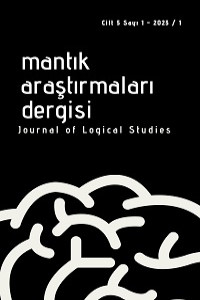Issue Editorial Board
 0000-0001-9874-1058
0000-0001-9874-1058

 0000-0003-3167-9696
0000-0003-3167-9696


Aim & Scope
Journal of Logical Studies is an international research journal which is published biannually. JLS aims to publish scientific research such as papers, book reviews and symposium reviews on logic and philosophy and to share these studies with public.
JLS provides articles written by qualified specialists in the area of Logic. It continues to publish compelling original research articles that contribute to the development of scholarly understanding and interpretation in the thought in all traditions and periods - including the areas of Logic and Philosophy. JLS publishes an English title, an abstract (at least 150 words), keywords (at least 5 concepts), a summary (at least 750 words), and a bibliography prepared in ISNAD Citation Style for each article.
Writing Rules
General Principles
1. JLS is a peer-reviewed journal and it is publishing place is Kayseri/TURKEY. It is published biannually. When necessary, it can be also published as special publications and extra-publications apart from these publications...
2. JLS is an academic journal which publishes studies such as presentation articles, translations, interviews, scientific articles about all branches of Logic and Philosophy.
3. These scientific articles, interviews, translations, and presentation articles which is added to the journal system is accepted as an application for publishing the article and the article is sent to peer-reviewed journals.
4. All the copyrights of the articles sent to the JLS belong to the journals, and it can not be published in another journal, copied or used without refering as a source or without getting permit from the JLS.
5. The publication language of JLS is Turkish, English, Arabic, and other spread world languages. On the other hand, if necessary, the articles can be accepted in other languages.
6. There must be at least 200-250 vocabulary Turkish (summary) and at least 750 words English (absract), 3-5 vocabulary Turkish (key words) and English (key words). There must be Turkish and English titles. The articles which do not fulfill these conditions are not published even if they completed their peer-reviewed process.
7. As the articles sent to JLS is going to be in the process of the refree, there must notbe decipher knowledge of the identification or the name of the author in the articles added to the system. After completed of the process of the article's peer-reviewed, it will be added in the information about the author or authors.
8. After the article is uploaded to the system by the author, the processes below have occured. Loaded article has been checked in terms of the rules of publishing and spelling by the editor/the assistant of the editor. After the editor has completed the approval, the article has been directed to the writing refree. Three refrees have been appointed for every article having been confirmed. One of these refrees is the language summary refree. Other two refrees consist of Professional academics in their branches. The author must check the duration of the refree of his own article from his main page.
9. After the articles are sent from the personal page JLS through the e-mail and password, refree process of the articles can be followed from the same page. Folloving this stage, it must be waited for the reports to come to do the correction. Because the author can add only one correction.When one refree does the correction he wanted and the article is added to the system, in the next stage, if the second refree wants to correct something, these corrections will not be done.
10. The articles added to the system of the journal must not be published in another place. Symposium report can be published with the explanation of the situation throuhgh footnote in the article.
11. The work referred under the title of SOURCE at the end of the article must be organized by the way in the order of author's surname, author's surname is in capital author's name is in small letter.
12. When you request a member of JLS as an author or a refree, all information required must be filled completely. Work and interests of the author/refree in the title of autobiography must be put in order. In the title of main branch first the main branch must be written and then the branch must be written.
Ex: Management/management an organization; Turkish language and literature/new Turkish language
13. JLS is online journal.
14. Writing must be organized respecting to the measures below while they are added to the journal system.
Page Layout
1. Writings must be written in the Microsoft Word program and pages must be organized like below.
|
Format: |
A4 Vertical |
|
Top Margin: |
5 cm |
|
Bottom Margin: |
5 cm |
|
Left Margin: |
4,5 cm |
|
Right Margin: |
4,5 cm |
|
Font: |
Platino Linotype |
|
Font Style: |
Normal |
|
Writing and Gap Size (Body): |
10,5 |
|
Abstract |
9 |
|
Writing and Gap Size (Footnote Text): |
9 |
|
Paragraph Spacing: |
First 6 nk – Then 0 nk |
|
Paragraph Indent: |
1 cm |
|
Line Spacing: |
Only |
2. In the writings used a special font which is not in the Microsoft Word Program, font sytle which is used must be added while the article is added to the system.
3. There must not be details such as page number, header and footer in the articles.
4. In terms of spelling and punctuation, except when the article or the subject is compulsory, Turkish Language Association pelling guide must be taken essential.
5. In the reference systems of the articles, Chicago system can be performed. But there must be references at the end of every article.
Ethical Principles and Publication Policy
Genel İlkeler
1. Uluslararası hakemli bir dergi olan MAD’in yayın yeri Kayseri'dir. Yılda 2 (iki) sayı olarak yayımlanır. Gerektiği durumlarda bu sayıların dışında özel sayılar ve ek sayılar yayımlayabilir.
2. MAD, Öncelikle Mantık olmak üzere Felsefe, Felsefe Tarihi, Din Felsefesi alanları ile ilgili bilimsel makaleler, röportajlar, çeviriler, tanıtım yazıları vb. çalışmaları yayınlayan akademik bir dergidir.
3. Bilimsel makaleler, röportajlar, çeviriler, tanıtım yazılarının dergi sistemine eklenmesi, yazının yayınlanması için başvuru olarak kabul edilir ve yazı hakem sürecine gönderilir.
4. MAD’e gönderilen yazıların bütün telif hakları dergiye aittir. Bu yazılar MAD dergisinden izin alınmaksızın başka bir yerde yayınlanamaz, çoğaltılamaz, kaynak gösterilmeden kullanılamaz. Ayrıca yazılardan doğabilecek herhangi bir yasal sorumluluk yazarlarına aittir.
5. MAD dergisinin yayın dili Türkçe, İngilizce, Arapça ve diğer yaygın kullanılan dünya dilleridir.
Price Policy
Dergimizin makale gönderim ve süreç işletimi ücretsizdir. Dergimiz tarafından çalışmaları yayınlanan yazarlara telif ücreti ödenmemektedir.

